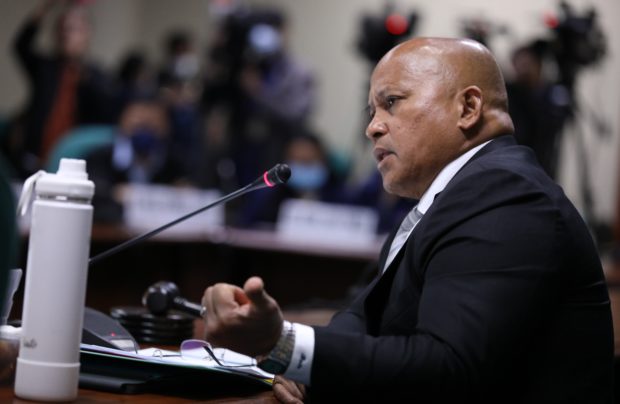Bato: ICC transgresses Rome Statute if it intrudes even PH courts are in action

Sen. Ronald “Bato” dela Rosa. Senate PRIB file photo
MANILA, Philippines — The International Criminal Court (ICC) violates the very agreement that crafted it — the Rome Statute — if it insists on investigating the Philippines’ drug war even if the country’s justice system is still operational, Senator Ronald dela Rosa said on Thursday.
He responded to questions from reporters on Thursday about ICC Prosecutor Karim Khan’s position that the ICC had jurisdiction over the Philippines during the drug war’s alleged crimes against humanity.
Dela Rosa agrees with Khan’s views that the Philippines was still under ICC jurisdiction. However, he noted that ICC violates Article 1 of the Rome Statute, which states that the court’s role would be “complementary to national criminal jurisdictions.”
“Tama siya doon pero they are the ones violating ‘yong Article 1 ng Rome Statute, ‘di ba ‘yong about complementarity, insisting sila na sila ang mag-imbestiga na buhay na buhay naman ‘yong ating criminal justice system natin dito,” he said.
(He is correct in that sense, but they are violating Article 1 of the Rome Statute regarding complementarity, insisting that they investigate while our criminal justice system is very much alive.)
“Sinabi lang doon sa (Article) 1 ng Rome Statute na if the government is not capable or not willing to conduct the investigation, then papasok ang ICC. In that case they are the one violating that Statute, dahil we are willing and we are capable, ‘yong ating gobyerno may ginagawang imbestigasyon Bakit sila papasok? So sila mismo nagviolate ng Article 1,” he claimed.
(It was stated in Article 1 of the Rome Statute that if the government is not capable or not willing to conduct the investigation, only then would the ICC intervene. In that case, they are the ones violating that Statute because we are eager and we are capable; our government is doing the investigation. Why would they interfere? They break Article 1.)
READ: ICC prosecutor Khan rejects PH gov’t’s plea to halt drug war probe
It could be remembered that former president Rodrigo Duterte withdrew the Philippines from the Rome Statute in March 2018, claiming that the ICC had been involved in a concerted effort to paint him as a human rights violator.
The supposed rights violations centered under Duterte’s drug war, where Dela Rosa — the former president’s first police chief — was the alleged leading implementer. Both have been charged for their role in the drug war.
Duterte and his administration constantly denied the existence of extrajudicial killings in the drug war, even as critics claim that the number of dead drug suspects hovers between 12,000 to 30,000.
READ: Drug war critics file complaint vs Duterte for ‘crimes against humanity’
Last March 13, the Philippine government asked the ICC Appeals Chamber to discontinue the drug war probe because it has no jurisdiction over the country. But the ICC replied that the Philippine government failed to explain why there is no legal basis for the ICC prosecutor’s investigation to continue.
ICC also said before that they were not satisfied with the efforts of the Philippine government to investigate the drug war killings — which was the premise for suspending the investigation in 2021.
READ: ICC resumes full-blown probe of Duterte drug war
Dela Rosa maintains that he would not cooperate with the ICC probe, as the government has maintained that it would not cooperate due to lack of jurisdiction.
“How would I cooperate when the government does not want to cooperate, what does it make of me? That I a rebellious child or a disloyal na citizen of this republic? The position of the government is not to cooperate, so why would I insist? It doesn’t make sense,” he said in a mix of English and Filipino.
“If the government says that they would cooperate, then I would take part because I am part of this government although I am with the legislature, but still we are one branch of the government,” he added.
While the country’s justice system remains functional, there are only two cases where police conducting anti-drug operations were convicted of murder — that of 17-year-old Kian delos Santos, and the case of 19-year-old Carl Angelo Arnaiz and 14-year-old Reynaldo “Kulot” de Guzman.
Delos Santos was killed in August 2017 despite not being the original target of the drug operation in Caloocan City. He was shot point-blank even if camera footage showed him pleading for his life.
READ: 3 policemen guilty of killing Kian delos Santos — court
Arnaiz and de Guzman were neutralized two days before delos Santos’ death. The two victims’ bodies were found in different areas – Arnaiz in a funeral in Caloocan City, and de Guzman, in a creek in Nueva Ecija.
READ: Caloocan cop found guilty for ‘drug war’ deaths of two teens